Choosing the best mulch for your vegetable garden can be intimidating. The good news is that there are lots of great options to choose from.
In this post, I’ll tell you all about the different types of vegetable garden mulches, including the benefits and cautions of each, how to choose which one(s) to use, and what kinds to avoid.
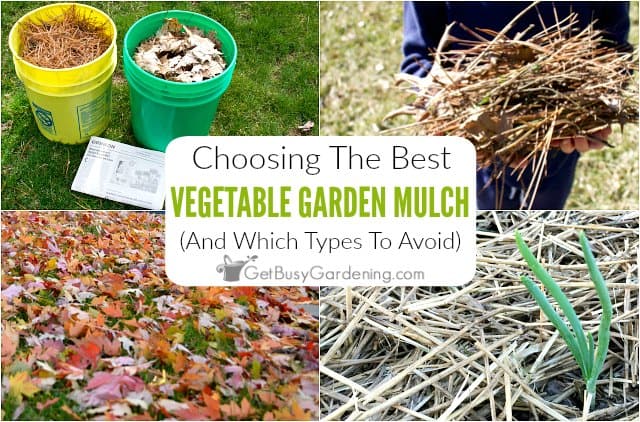
![]()
What Kind Of Mulch To Use For Vegetable Gardens
The best type of vegetable garden mulch to use in your beds is a lightweight, organic material that will break down quickly. These are ideal because they…
- feed the soil as they break down, adding nutrients to your veggie garden.
- make planting easy, because you can till or turn them into the soil each year.
- are less expensive, since you can find many of these materials right in your home or yard.
- are easy to find and readily available.
Related Post: How To Mulch Your Vegetable Garden
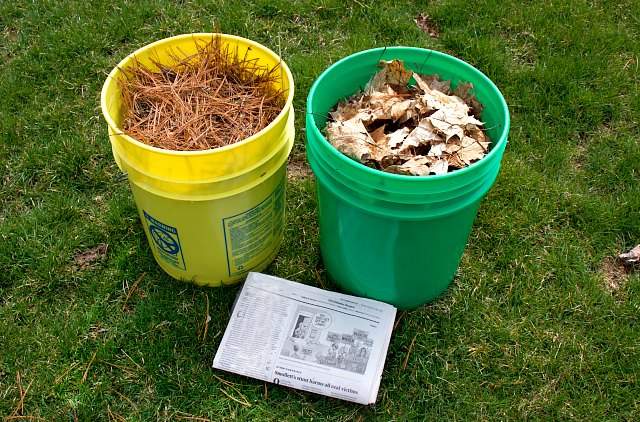
Different types of vegetable garden mulches
9 Best Types Of Vegetable Garden Mulch
Below is my list of the best organic mulches to use in your veggie patch, along with any pros, cons, and precautions for each.
You don’t need to choose only one kind either. You can mix and match any of these together, and make use of whatever materials you have on hand.
1. Grass Clippings
You can use the clippings from your own lawn, or ask your neighbor for theirs, they are a great organic option. Plus it’s free, and you can’t beat that price tag.
But there are a few precautions to think about. First, never use grass clippings if you treat your lawn, even if you use organic products, because they contain herbicides. This can cause major problems in your garden, and may even kill your plants.
Also, be sure to use grass clippings only if your lawn hasn’t gone to seed. You don’t want to dump grass seeds into your veggie patch.
Related Post: How & When To Fertilize Your Vegetable Garden
2. Hay Or Straw
Hay and straw are both very popular choices, and they give your beds a nice finished look. They’re easy to find at any home improvement store or garden center. Plus the bales are inexpensive to buy (especially in the fall).
However, if your garden does not drain well, these mulches can become moldy. Also, some types of hay or straw can be filled with seeds. So be sure to purchase high-quality, seed-free bales.
Otherwise, if you live in a cold climate like I do, purchase them in the fall and leave them outside through the winter. That way they will start to break down, and the cold weather will kill many of the seeds for you.
3. Sawdust
Sawdust is a great mulching material, and can be free if you know someone who does a lot of woodworking. It keeps weeds from growing, and looks nice too.
However, depending on the type of wood, it can be acidic, and it could also leach nitrogen from the plants. So be sure to test your garden soil often, and amend it as necessary.
4. Pine Needles
Pine needles are another great vegetable garden mulch option. For those of you that live surrounded by pine trees, this is also a free one.
But they can add extra acidity to your soil, and most vegetables like it to stay neutral or alkaline. So it’s a good idea to monitor the levels regularity with a pH probe. Adding garden lime to your beds is an easy way to neutralize the acidity.
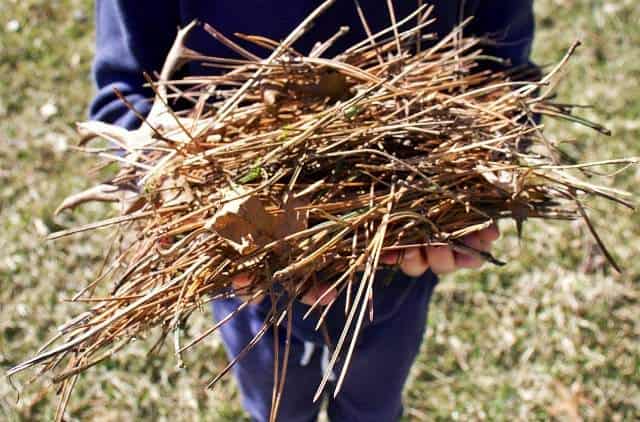
Try pine needles as vegetable garden mulching materials
5. Newspaper
Modern newspapers are printed using soy-based ink, which is non-toxic and biodegradable – so it’s a safe mulch option to use in your vegetable garden.
However, since it’s very lightweight, the paper will blow away in the wind. So it’s a good idea to either shred it and wet it down, or cover it with another type of mulch to keep it from blowing away.
6. Leaves
Leaves are everywhere, and the top vegetable garden mulch choice for many. They’re easy to use, since you can just toss them over your beds as you rake them up in the fall. Plus they’re free.
But not all leaves are created equal. So be sure you know what type of tree your leaves come from before using them to much your veggie garden.
Some types of leaves (like those from a black walnut tree) contain substances that will hinder plant growth, or even kill susceptible vegetables.
Dried leaves can also become compacted, which can create a hard surface over your garden. This can prevent water from soaking into the soil. So, just be sure to keep them wet so they decompose faster.
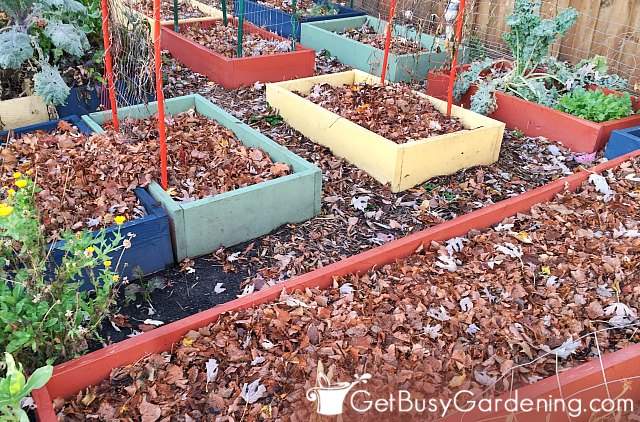
Using leaf mulch for vegetable garden beds
7. Compost
Compost is made of organic materials you discarded from your kitchen or yard. It’s nutrient-rich, and helps the environment by keeping food waste out of the trash. If you don’t have a compost bin, it’s easy to find it for sale at your local garden center.
There are a couple of things to consider before using compost as vegetable garden mulch. First, it will need to be refreshed regularly to keep weeds from becoming established.
Also, homemade compost can contain seeds. So be sure everything is well composted before using it in your veggie beds.
8. Cardboard
Cardboard is another wonderful option for mulching vegetable beds, and is readily available. It does a fantastic job of keeping the weeds from growing, and can also be used to smother existing weeds.
Since it’s so lightweight, you may need to secure it to keep it from blowing away. Or you can cover it with another type of mulch to weigh it down.
To make planting easier, it’s best to lay the cardboard down after you’re done, rather than trying to cut hole for your plants. Also, since cardboard is so dense it will break down much slower if it dries out.
9. Shredded Bark
You can buy shredded bark at your local garden center or home improvement store. Be sure to get the stuff that is very finely shredded and lightweight, rather than the thicker and heavier wood chips.
If you choose to use shredded bark, you shouldn’t till or turn it into your soil, or it can steal nitrogen away from your plants. Instead you should refresh it every year by applying it over the top of the old layer.
Related Post: Spreading Mulch Tips: Best & Easiest Way To Lay Mulch Evenly
Mulches To Avoid In Using In Veggie Beds
Below is a list of the types of mulch you should avoid using in your vegetable garden. These are too heavy, won’t break down quickly enough (or at all), will make planting difficult, and/or they can leach harmful chemicals into your soil.
- Hardwood chips
- Rocks
- Inorganic mulches (like rubber or plastic chunks)
- Dyed mulches
Deciding what kind of mulch is best for your vegetable garden doesn’t have to be intimidating. Experiment with whatever materials you have available to you to see which one you like. You can always combine several of these options too.
More About Vegetable Gardening
- Growing Vegetables: The Ultimate Vegetable Garden Guide
- How To Water A Vegetable Garden, The Right Way!
- Tomatoes Not Turning Red? Try These 5 Tricks
- How & When To Plant Garlic In Your Garden
- Guide To The Best Fertilizers For Vegetable Gardens
What is your favorite mulch to use in your vegetable garden and why? Tell us in the comments below.
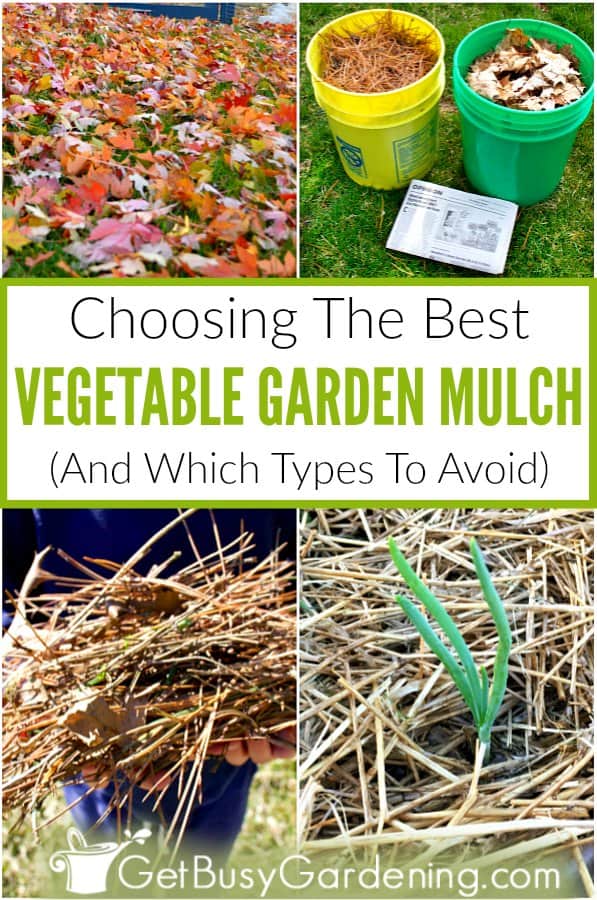
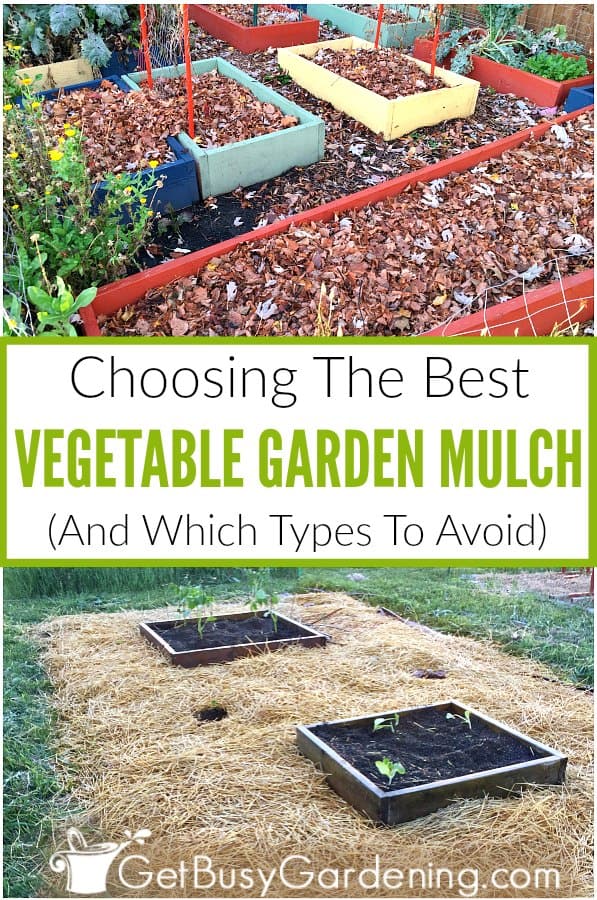
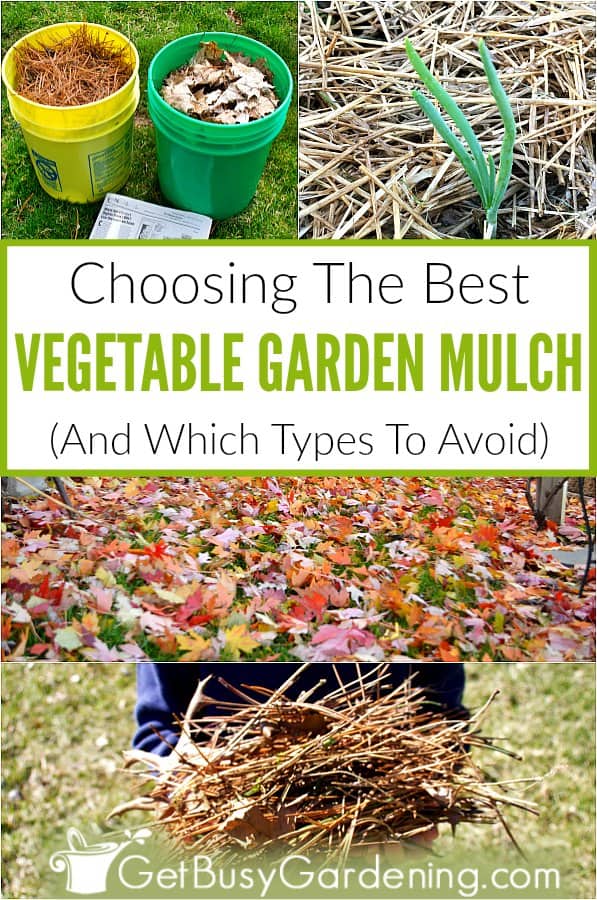
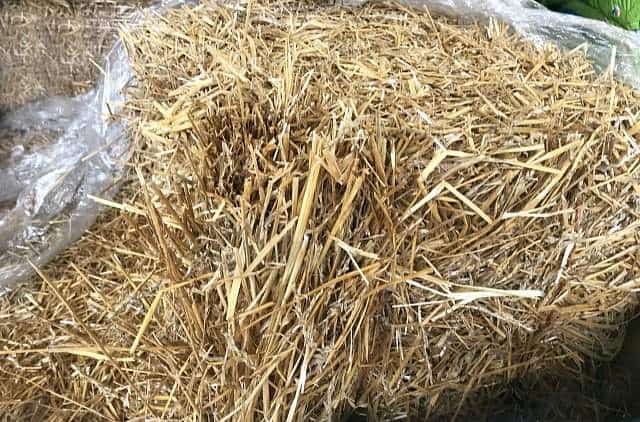
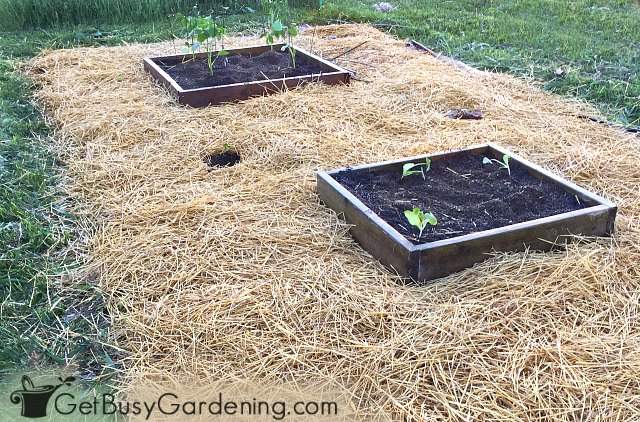

Judy M. says
When do you add peatmoss? Can this be a mulch? I know it makes the soil light & fluffy.
Amy Andrychowicz says
Yes, you can use peat moss as a mulch. However, it does add acidity to the soil, and most veggies prefer it alkaline. So, if you plan to use it, then make sure to monitor the pH closely.
Trish B says
I like using a mix, straw and wood chippings I get from a local company. As you say, you have to keep it from packing down and always check for mold in straw! I have not used leaves as I never know what works or not but a part of me just loves pine needles!
Thanks for the informative post!
Amy Andrychowicz says
You’re welcome, glad you found the article so helpful! 🙂